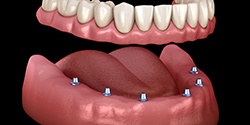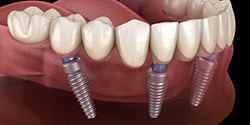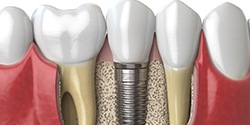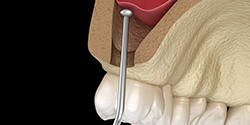Dental Implants – Denton, TX
A Transformative Solution to Tooth Loss

Whether you’re struggling with the loss of a single tooth or several, this absence can negatively affect your health, your self-confidence, and your overall quality of life in a variety of ways. That’s why securing a replacement as soon as possible is so important, and there’s no better option available today than dental implants.
Why are dental implants in Denton the right choice? Because unlike their traditional counterparts, they replicate the entire structure of your natural tooth instead of just the white crown that sits on top. By providing a brand-new tooth root that functions just like the original, your jawbone’s ongoing health is preserved and your smile remains stronger and more functional. If you’d like to learn more about dental implants or set up a consultation with Dr. Todd Balington, please call Denton Dental Center today!
Why Choose Denton Dental Center for Dental Implants?
- Partners with Dental Implant Specialists in Denton
- State-of-the-Art Dental Technology for Precise Treatment Planning
- Insurance-Friendly Dental Practice with Financing Options Available
What Are Dental Implants?

Dental implants are small, biocompatible posts that resemble a screw in shape and size. Once they are surgically placed into the jaw, they mimic the function of tooth roots. The implants provide support for a replacement tooth or teeth by stimulating the supportive structures to maintain jawbone density and gum tissue volume. Strategically positioned implant posts can be used to support a single replacement tooth or a complete row of teeth. Once the dental implant process is complete, you’ll have a set of pearly whites that look, function, and feel just like your original ones!
The 4-Step Dental Implant Process

With a more than 95% success rate and the potential to last a lifetime, it’s no surprise that dental implants are preferred by patients and dentists alike. That being said, they do require a lengthy treatment process that involves oral surgery. Even though the dental implant process can take several months to a year or longer, the stability and longevity that your new teeth will provide makes them worth the wait! Every patient’s journey is slightly different, but here’s a basic breakdown of how dental implants work in Denton.
Initial Dental Implant Consultation

As with most treatments, getting dental implants starts with a consultation. We use digital x-rays and a CT scan to assess the health of your jawbone and to determine the precise placement for the implant posts. Based on the results of the examination, your implant dentist in Denton may determine you need additional treatments before placing your posts, such as bone grafting or a sinus lift. Once these procedures are finished, we can schedule your surgery.
Dental Implant Surgery

Computer-guided surgical technology helps our partnered experts place your implant posts into their ideal location. Sedation or anesthesia are used to ensure your comfort during the surgery. Your gum tissue is opened to expose your jawbone, and the posts are positioned in pre-determined ways. Your gum tissue is sutured closed to allow the healing process to begin.
Dental Implant Osseointegration & Abutment

The implant posts act as new tooth roots, stimulating your jaw to encourage new bone growth. Over the next few months, your jawbone fuses to the posts through a process called osseointegration. This allows your dental implants to potentially remain in place forever while also providing a stable foundation for your new smile.
After adequate healing occurs, you are scheduled for a second minor surgery to place the abutments on your posts. The special fixtures connect your restorations to the posts.
Delivery of Dental Implant Restoration(s)

By this point, we will have taken impressions of your mouth and sent them to a dental lab in the area. There, a team of skilled technicians will design your new replacement teeth to look just like your natural ones. Once you’ve recovered from your abutment surgery, which should only take about two weeks, we can finally secure your custom crown, bridge, or denture into place. At long last, you can enjoy your newly rebuilt smile!
Benefits of Dental Implants

There are many great benefits of dental implants in Denton. When meeting with our team for your initial consultation, you can expect us to go over some of these advantages, so you will have a clearer understanding of why millions of Americans have chosen dental implants over traditional prosthetics. With the number of surgical implantations going up every year, patients are now choosing longevity over affordability. Not only will you see noticeable benefits in the way you eat and speak, but you’ll possess greater confidence that leads to you smiling everywhere you go.
Day-to-Day Benefits

- Enjoy your favorite foods: Instead of worrying about your prosthetics slipping or falling out, your new teeth will remain firmly in place while eating and chewing. You can consume your favorite foods and worry less because your implants will remain balanced and sturdy.
- Improved aesthetics: No longer will tooth loss cause changes to your facial shape. With dental implants in Denton, you can enjoy a fuller appearance that causes you to look younger and feel more confident in your overall look.
- Embracing life: Unlike denture-wearers that often remark of their discomfort at social gatherings or inability to go out and feel comfortable with their smile, you can freely engage with others knowing your teeth look and feel completely natural. This enables you to embrace a better quality of life.
Health Benefits

- No altering of your natural teeth: Dental implants do not require that we alter your existing teeth. Unlike dental bridges that use abutment teeth as anchors, implants are surgically placed into your jawbone, causing your remaining healthy teeth to remain untouched.
- No jawbone deterioration: Dental implants are designed to stimulate your existing jawbone. This not only helps when eating and speaking, but it also prevents additional tooth loss.
- Existing teeth remain in place: There is no dental drift that comes with dental implants. Instead, your natural teeth will remain in place, never shifting to cover any gaps. This can help prevent the possibility of orthodontic treatment later on.
- Better oral health: Tooth loss can cause many systemic issues to develop over time. By opting for dental implants, you minimize your risk and instead, live life without the worry of developing overall health problems as a result of missing teeth.
Long-Term Benefits

- High success rate: Having a trusted implant dentist in Denton place your dental implants will often result in a success rate of 95%. This rate can remain the same after 10 years if you take proper care of your smile.
- Greater longevity: Most dental implants can last 30 years or even a lifetime as long as you maintain them.
- Money savers: Surprisingly, dental implants can save you money in the long run because you won’t need denture adhesives, regular replacements or adjustments, or special cleaning supplies.
Who Dental Implants Can Help

The great thing about dental implants in Denton is that virtually any healthy adult with missing teeth can qualify for the treatment! After you meet with Dr. Balington for an initial consultation, he can determine which of the following dental implant options would best meet the needs of your unique smile. If you’re unsure whether you’re eligible for this solution, then read on to learn a little more about the treatment process.
Who Is a Good Candidate for Dental Implants?

While the vast majority of healthy adults are able to receive dental implants, certain requirements should be met in order to ensure the highest likelihood of successful treatment. For example, an ideal dental implant candidate should have:
- Good oral health – Tooth decay, gum disease, and other oral health concerns should be addressed before surgery to prevent them from complicating the healing process.
- Adequate overall health – Dental implant placement involves a minor oral surgery. This means that should be free of any chronic medical conditions that could make surgery risky.
- Strong jawbone – If the jawbone is not dense enough, the implant post won’t be able to properly fuse with it. In this case, a bone grafting procedure may be necessary to thicken that section of the jaw.
Once all preliminary issues have been squared away, we can move forward with your treatment. Depending on your specific circumstances, your dental implant dentist in Denton will recommend one of the following options:
Missing One Tooth

To fill a gap created by a single missing tooth, we can place an all-ceramic dental crown on top of an implant post that has been inserted vertically into the socket. This crown will be customized to blend right in with the surrounding teeth. Plus, it doesn’t require the removal of healthy tooth enamel like a dental bridge does, making this treatment more conservative and beneficial in the long run.
Missing Multiple Teeth

Two dental implant posts can replace several consecutive missing teeth simultaneously. This is done by placing an implant at either end of the gap and securing a lifelike dental bridge onto them. You’ll be able to enjoy the stability of dental implants and the seamless appearance of a bridge without having to alter any of your remaining teeth. If you’re missing multiple teeth at various locations along an arch, then we can attach a partial denture onto a small number of strategically placed implants.
Missing All Teeth

If you have lost all of the teeth on an arch, you won’t need to replace each individual tooth with its own implant post. Instead, an average of six to eight implants placed at precise locations throughout the jaw can provide enough support for a full denture. Implant dentures are much more stable than traditional ones, and they last longer and restore more chewing power as well. These prosthetics can be fixed or removable in nature, depending on the patient’s unique needs and preferences.
Learn About Implant-Retained DenturesMissing All Teeth with Low Jawbone Density

Have you experienced bone loss in your jaw after losing your teeth? With most dental implant treatments, you’d have to undergo a bone graft first, which adds several months until you can enjoy your new teeth. In many cases, All-on-4 allows you to receive your implants without the need for bone grafting. Just four implants are inserted at strategic locations and angles in the jaw, making use of the existing bone mass. Additionally, All-on-4 patients can often have their denture placed at the same time as their implants!
Understanding the Cost of Dental Implants

It is no secret that the cost of dental implants in Denton is initially higher than that of traditional treatments like dentures. Rest assured, though, that it is money well spent! With a success rate of more than 95 percent, dental implants can last for several decades, so you should never need to worry about having them replaced. Not to mention, they improve your oral health to reduce your long-term dental expenses. During your initial consultation, we provide you with an estimate of your procedure and discuss your payment options, such as dental insurance and CareCredit financing.
Preliminary Treatments & Dental Implant Surgery

First, you must attend a consultation to evaluate your candidacy for dental implants. Dr. Balington will take X-rays and a CT scan to determine whether your mouth and jaw can currently accommodate the implant posts. In some cases, you may need to complete one or more preliminary procedures before dental implant surgery. If your jawbone has weakened after tooth loss, for example, you might require bone grafting to build it up to the ideal strength. Although these treatments increase your chances of long-term dental implant success, they do add to your total costs.
There’s also the cost of the surgery itself. You’ll have to pay for any sedation or anesthesia you receive, as well as any fees incurred by visiting a separate implant dentist in Denton for the procedure.
The Parts of Your Dental Implant

Each of the three parts of your dental implant – the post, the abutment, and the restoration – comes with its own cost. The posts and abutments can be made from various materials, each of which is ideal for different patients and carries a different price. Additionally, the restoration (crown, bridge, or denture) that is placed on top also has its own cost. In general, the more teeth you’re replacing, the higher the price of your restoration.
How Dental Implants Pay for Themselves

When you look at the initial cost of dental implants, it may seem unlikely that they could save you money in the long run, but it’s true! This is because:
- You won’t need to replace your prosthetic every five to ten years like you would with a bridge or denture, which can add up over time.
- You won’t have to purchase adhesives or special cleaning products to keep your new teeth stable and in good condition.
- Because dental implants are easy to maintain, they naturally lead to better oral health, decreasing your risk of dental issues that require expensive treatments.
Does My Dental Insurance Cover Dental Implants?

Dental insurance will most likely not cover the entire cost of dental implants. However, depending on your specific policy, they may pay for a portion of your treatment (such as preparatory procedures) until you reach your annual limit. At Denton Dental Center, we’re proudly in-network with many of the nation’s leading dental insurance providers, including Delta Dental, Cigna, BlueCross BlueShield, and Humana. We’ll even work with most out-of-network PPO plans to help you make the most of your benefits!
Making Dental Implants Affordable

We strive to keep your new smile affordable, which is why we accept a variety of payment options for dental implants in Denton. Besides traditional payment methods, we also accept CareCredit. Based on your credit’s approval, you are given the funds you need to pay for the treatment. You then repay the balance using a payment plan that fits your budget. Plus, these plans often come with incredibly low or even ZERO interest rates!
Dental Implant Technology

As you can imagine, placing dental implants requires quite a bit of precision. The planning process for the treatment is extremely important. A patient doesn’t just tell us they want dental implants and then show up for an appointment to get them! Several factors like the thickness of the jawbone, the orientation of the nearby teeth, and the location of nerves and blood vessels in the mouth can all influence how we decide to perform the procedure. Thankfully, we have the technology to make this part of the process extremely effective, and our system has allowed our team to place countless implants successfully and comfortably.
3D Cone-Beam Imaging/ 3D CT Scanning

The most important piece of equipment during the planning phase is our CB/CT scanner, which stands for “cone beam computer tomography.” While that might sound like a mouthful, the way the device actually works is relatively simple.
Traditionally, an X-ray captures a 2D image of whatever it is photographing. This can reveal plenty of information, but a lot is left out as well because the field of view is so limited. A CB/CT scanner is more like a CAT scan, in that it creates a 3D X-ray image. With it, we can generate an extremely detailed digital model of the entire head, including the teeth, jaw, and supporting oral structures. This image not only shows us the general shape of someone’s dental anatomy, but several other details as well, like the thickness of the bone and the location of sensitive nerves. This information allows us to come up with extremely precise treatment plans for dental implant placement.
To get this kind of image, a patient simply has to place their chin onto a small rest attached to the scanner, and the special cameras rotate around the head. The entire process usually takes just a few minutes.
With the image from the scanner, we can determine not only where an implant should be placed into the jawbone, but at what angle and how deep. This can help us decide which type of implant to use, as implant roots can vary in length and width. This way, we can ensure that an implant will have the best possible chance of bonding to the surrounding bone and won’t disturb any nearby teeth or nerves. By the time a patient actually shows up to have their implants placed, we already know exactly how the procedure will unfold. There are no surprises, so the treatment can go quickly, smoothly, and the patient can begin recovering right away.
When you combine this scanner with the high-quality materials used to make implants themselves, as well as the expertise of our skilled team, you get a treatment that is comfortable, reliable, and can be trusted to help a patient recover their smile for decades to come.
Advanced Dental Implant Procedures

Dental implants can last forever with the right foundation and the proper aftercare. The long-term success of your new smile relies on your jawbone’s ability to support the posts and correctly fusing to them. To ensure a successful treatment, you may need additional procedures before having your implant posts placed into your jawbone, such as bone grafting or a sinus lift. At Denton Dental Center, we can rebuild your smile, even if you have complex needs.
Bone Grafting

Periodontal disease is the leading cause of tooth loss. Not only does it make your teeth fall out, but it also destroys your jawbone. You also lose density in your jaw if you do not replace missing teeth right away because there are no longer roots to stimulate bone growth. If you do not have enough bone left to support the posts, you will need bone grafting.
A small section of bone is taken from a donor or from another area of your body and grafted to your jaw using a surgical procedure. Your body naturally accepts the graft over the course of the next several months. After adequate healing occurs, you are a suitable candidate for dental implants.
Sinus Lifts

A sinus lift, also known as a sinus augmentation, is used to add height between your jaw and your maxillary sinuses to make room for the implant posts. This is most often needed when premolars or molars are being replaced with dental implants.
During the treatment, an oval is cut into your jawbone near the sinuses on the side of your nose. Your sinus is pushed upward before a bone graft is placed into the oval opening. Your jaw will accept the graft over the next several weeks.
Maintaining & Caring for Your Dental Implants

Your new dental implants can keep your smile strong, healthy, and beautiful for the rest of your life! However, it is crucial that you’re taking all the right steps to care for your new and improved pearly whites. If you aren’t careful, you could end up with damage or an infection. Here are some simple precautions and healthy habits that can help you keep your smile safe for many years down the road!
Make Oral Hygiene a Priority

Dental implants themselves are unable to get cavities, but you still need to practice excellent oral hygiene. Oral health issues, like gum disease, can cause you to have a dental implant failure. Remember to brush twice a day using a soft-bristled toothbrush. Floss every day and rinse your mouth with mouthwash for extra freshness.
Eat a Healthy Diet

One of the great things about dental implants is the fact that you don’t need to worry about eating restrictions. You should be able to eat a full, nutritious diet with your replacement teeth. However, it’s still a good idea to avoid overindulging in hard, sticky, or sugary foods. Remember to eat foods with plenty of calcium and vitamin C to keep your jawbone strong and your gums healthy!
Break Bad Habits

Bad habits can cause damage to your dental implant or even cause a dental implant failure! Refrain from smoking and chewing tobacco, as this can slow healing and encourage infection. Don’t use your teeth as tools either. Find scissors, a bottle opener, pliers, or another tool to help you complete your task safely.
Protect Your Dental Implants

Dental implants are very strong, but they aren’t indestructible. By wearing a sports mouthguard to protect your implants during sports, you can prevent them from becoming damaged. If you grind your teeth at night, you may want to look into getting a nightguard. This will protect your implant from additional wear and tear.
Schedule Regular Dental Checkups

Every six months, come see us for regular cleanings and checkups. This way, we can keep an eye on your dental implants and spot any issues as early as possible. The quicker a problem is detected, the more likely that it can be resolved!
Dental Implant FAQs

Before you get started with your implant tooth replacement plan at the Denton Dental Center, our team invites you to explore the answers to some of our Denton dental implant frequently asked questions on this page. This is not a comprehensive list of questions, so please don’t hesitate to call our team to find out more. For more extensive and personal questions about dental implants in Denton, we can schedule a consultation to discuss your specific case and address your concerns in greater detail and depth.
How Long Do Dental Implants Last?
Unlike other tooth replacement prosthetics that need to be replaced every five to ten years, implant-supported restorations can last two decades or longer with proper care. In order to ensure the longevity of your implant prosthetic, you should maintain regular dental appointments with our team. During these visits, we’ll examine your implant-supported replacement tooth or teeth and keep them functioning flawlessly for decades.
Are Dental Implants Safe?
Yes, dental implants are completely safe. Dental implants are made out of biocompatible materials, which means they are safe to put inside your body. The jawbone will bond with the implant, just as if it were a natural tooth. If you have pre-existing conditions, such as gum disease or bone density loss, we can address those issues before we place the implants, ensuring success. In the case of diabetes, cancer, or osteoporosis, we can talk about your condition and possible treatments during your consultation. That’s why we need you to be open about your medical and dental history!
Am I Too Young to Get Dental Implants?
Usually, we recommend that patients under the age of 18 wait to receive dental implants. Sometimes, we even push getting implants until the mid-20s! Prior to this age, a person’s jawbone is still developing, and inserting dental implants may disrupt this growth. There may be some exceptions or special cases where we place implants in a young patient, but we generally encourage postponing implants until after this milestone for the best results and least impact on oral development.
Will People Be Able to Tell I Have Dental Implants?
The only part of your replacement teeth that will be visible will be the custom restoration. Just like a natural tooth root, the implant post is hidden under the gums’ surface, and it keeps the jawbone stimulated and strong, helping you avoid that sunken appearance that is common with traditional dentures. As a result, those who look at your smile should not be able to tell you have one or more artificial teeth—unless you tell them!
Do Dental Implants Feel Natural?
Out of all the replacement options available, dental implants are the closest you can get to real teeth. Although implants have no tooth nerve, they are embedded in the jawbone, giving your prosthetic teeth almost as much strength as the real thing. This means you can feel free to bite and chew basically any food you want! You can also feel confident that your teeth will not slip or slide out of place because they are anchored to the jawbone. In other words, yes, dental implants do feel natural.
What Can Cause Dental Implants to Fail?
Dental implants can fail for several reasons, including tobacco use and chronic teeth grinding. That said, the two main causes are peri-implantitis and failed osseointegration. The good news is that our Denton dental team will go above and beyond to prevent either from happening by conducting a thorough oral exam prior to your procedure and giving you a list of aftercare instructions. We’ll also check the condition of your dental implants during your biannual dental checkups and teeth cleanings. That way, we can intervene right away if we notice that something isn’t right, like your dental implant is loose.
Will I Have to Take Off Work for Dental Implant Surgery?
Usually, patients take a day or two off of work. There are some exceptions, though. If, for example, your job is physically demanding, then you might need to take three or four days off to prevent blood from diverting from the implant site, delaying healing in the process. Ultimately, how much time you need to take off depends on your career and how many teeth you’re replacing, but you always have the option of scheduling your procedure on a Thursday or Friday so you have the weekend to recover as well.
Do Dental Implants Decay?
Dental implants are artificial, so they cannot decay. Since your natural teeth still can and it’s possible for your gums to develop an infection, it’s crucial that you continue to brush, floss, and rinse with mouthwash consistently. Make sure you commit to other healthy habits too, like coming to our office twice a year for a dental checkup and teeth cleaning!
Is There Anything I Shouldn’t Eat with Dental Implants?
Immediately following your dental implant procedure, you should stick to really soft foods, like applesauce and plain yogurt. Once you’ve fully healed and your new and improved smile is complete, you’ll be able to enjoy a much more varied diet. At this point, simply do your best to keep starchy, sugary, and acidic foods to a minimum, including potato chips, sour gummy worms, and whole lemons. That way, you’re much less likely to run into issues in the short and long-term.
Can I Get Dental Implants If I Smoke?
Although smoking doesn’t automatically disqualify you, it is something we need to seriously consider. After all, the increased risk of dry sockets, delayed healing, and dry mouth dramatically raises the chances of dental implant failure, which we want to avoid at all costs. At the absolute minimum, you need to avoid all tobacco products for two weeks prior to your procedure and for two months afterward.
Can Dental Implants Replace Molars?
Yes, dental implants can replace molars! So, if you are missing one or more of your back teeth, don’t hesitate to schedule a consultation with us to see if you’re a candidate for this state-of-the-art tooth-replacement solution. If you are, then we will create your custom treatment plan, and you’ll be a big step closer to a healthy, beautiful, and functional smile again.
